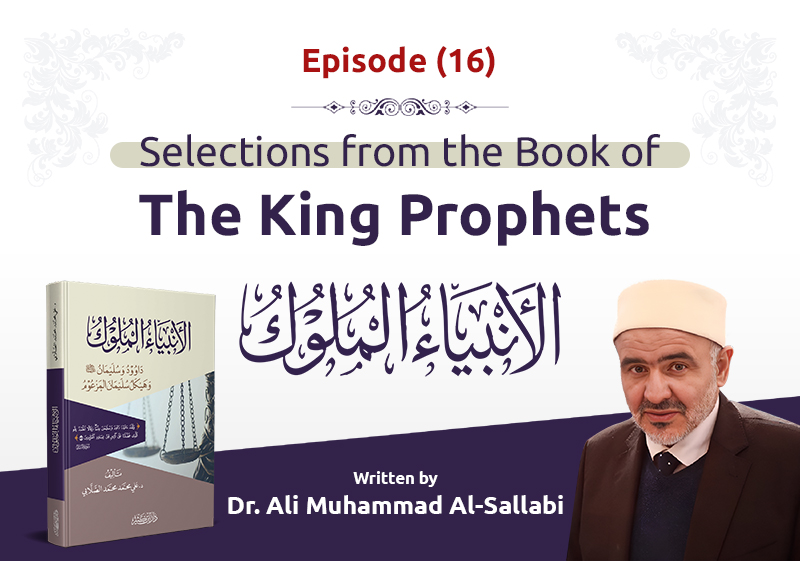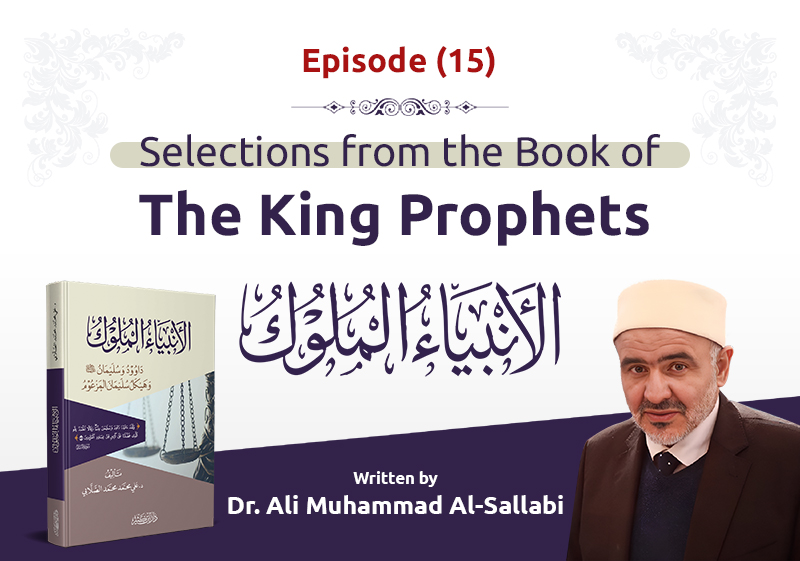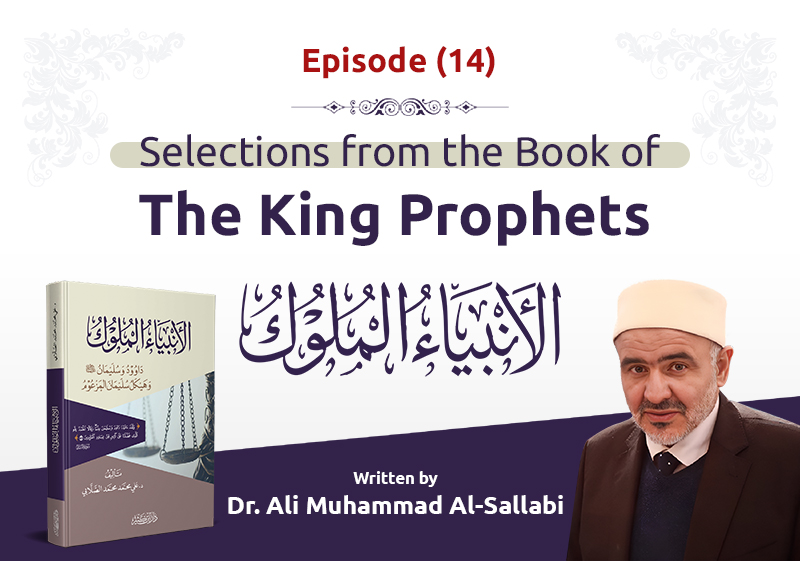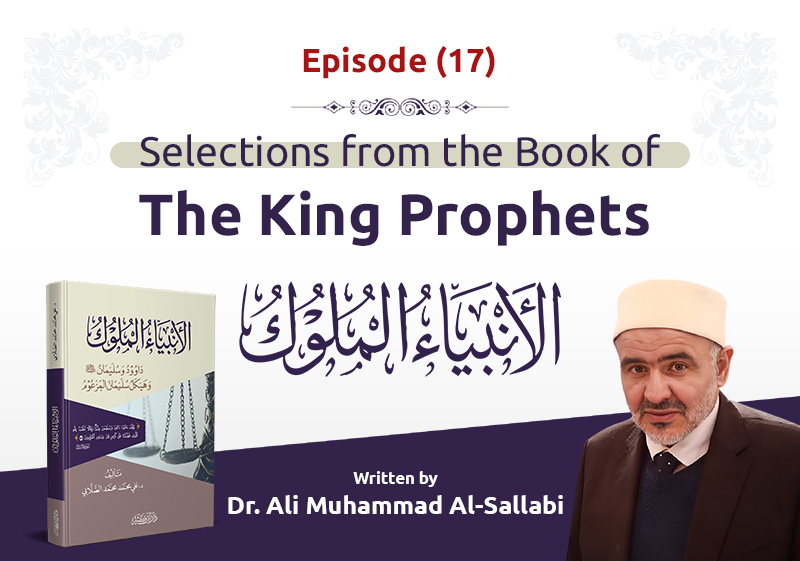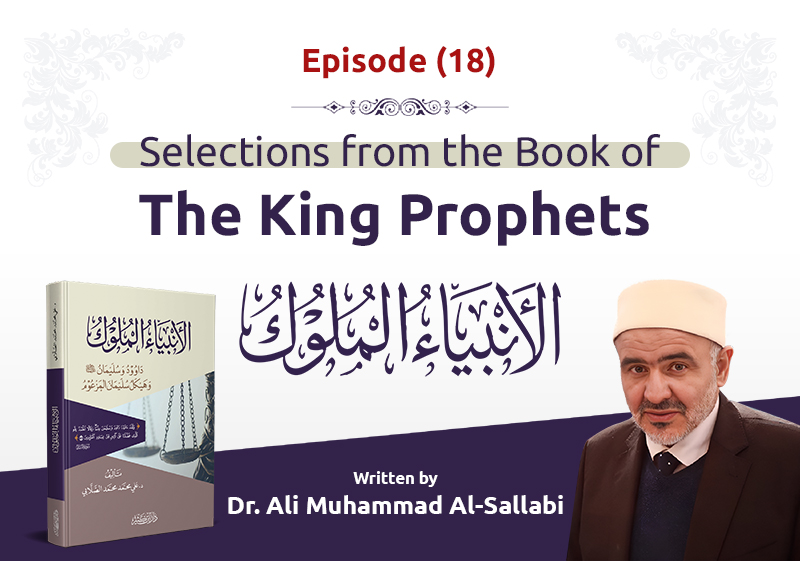Among the characteristics and conditions of good governance in the story of David, peace be upon him: (knowledge and wisdom)...
Selections from the Book The King Prophets...
Written by Dr. Ali Muhammad Al-Sallabi...
Episode (16)
Allah Almighty said: {and Allah gave him the kingship and prophethood and taught him from that which He willed}:
David was a prophet king, and Allah taught him the craft of zard and war equipment, which has been explained in detail in other places in the Qur’an. The first person to combine kingship and prophecy was David (peace be upon him).
A- The meaning of the name "David" which is “Dawud” in Arabic: It is an old Arabic word, which of its meanings (Affection), (Mercy), and (Friendliness); It is a relationship in which there is give and take. And (Dawud) by nature does not oppress or transgress, because he was prepared by Allah to be a caliph on earth to rule among the people with truth and guide to the straight path.
B- Sheikh Muhammad bin Uthaymeen (may Allah have mercy on him) said: {And Allah gave him} the direct object pronoun is referring to “David” meaning: Allah gave him {the kingship} so he became a king, and gave him {wisdom} so he became a messenger. He had all the qualities of the righteousness of religion, the life, the law, and the emirate. {And He taught him whatever He willed} That is, the prophets, peace and blessings be upon them, had no knowledge except what Allah taught them. According to the Almighty’s saying:{and taught him from that which He willed}. The Prophet himself does not know the unseen, and he does not know the Sharia except what Allah Almighty has given him. An example of this is the words of Allah Almighty to His Prophet Muhammad (peace and blessings of Allah be upon him): {And Allah has revealed to you the Book and wisdom and has taught you that which you did not know. And ever has the favor of Allah upon you been great}.
And in saying {and taught him from that which He willed}, proving the will of Allah, but know that Allah’s will is subordinate to His wisdom, as Allah Almighty said: {Indeed, this is a reminder, so he who wills may take to his Lord a way (29) And you do not will except that Allah wills. Indeed, Allah is ever Knowing and Wise (30)} [Al-Insan: 29-30].
C - Sheikh Muhammad Abu Zahra (may Allah have mercy on him) said: Allah Almighty mentioned the elements that are nominated for authority and rule of people, so they were body strength, wisdom, and knowledge. That is why Allah Almighty said after mentioning his killing of Goliath: {And Allah gave him kingship and wisdom, and taught him from that which He willed}. Wisdom is putting things in their proper place and managing wisely according to knowledge. Wisdom requires two intrinsic qualities in a person:
A- perceptive and perceptive mind that sees the inside of things and penetrates their depths.
B- strong will that makes work coincide with correct thought and sound perception.
Whoever opposes the reasons of mind and the rulings of sound thought does not become an authority. He who hastens to judge things without deep, inquisitive study is not wise, and he who does something other than what is required by the rules of sound thought is not wise.
Allah Almighty mentioned that He taught David much and extensive knowledge of what He wanted to teach him. His Almighty saying: {and taught him from that which He willed} indicates the breadth of knowledge, and that it is abundant and complex and is limited only by Allah’s will and will.
Allah Almighty taught him the politics of kingship, the conditions of people, the conflicts of souls, the conditions of countries, the good things they produce, and other things. Allah Almighty’s teaching to him was through the prophecy that Allah Almighty bestowed upon him, and the experiences that Allah brought to him, and the ammunition that was in his hands of the conditions of the previous rulers and guides, and the knowledge of the Torah that he was given, and the authentic news from the previous prophets. In all of this there is guidance and direction to the most correct approaches to correct governance.
They are the elements of good governance. The ruler must be strong in body, such that his body does not fail his will. Often, a weak will is a result of a weak body, and weak management is a result of the physical forces failing to endure, but the strong will and determination may be in a weak body, and in this case that element may be dispensed with, if there is no person in whom both the strength of the soul and the strength of the body are present. The first consideration is the strength of the soul, and the strength of the body is a servant of willpower and is not intended for its own sake.
The second element is wisdom: as you saw, it is making work go with the mind, so whims and desires do not control, and the bane of good rule is the desire of the ruler. If his desire prevails over his mind, corruption prevails over his judgment. So let every ruler test himself, and if he sees that his desires are in control, then he should know that evil has taken hold and it is better for him to retire, and if he finds that his mind is in control, then he should know that Allah has granted him success.
The third element: complete awareness of people’s interests and conditions: ruling is an act for the benefit, not dominance and control, and whoever thinks it is dominance and control is one whose insight has been obscured by Allah, his lust has overcome him, and then his misery has overcome him.
The difference between a good and bad ruling is precise in its meaning, even if the effect is great in its structure. A good ruling: its basis is that the ruling is in the interest of the ruled and a response to his desire, and a bad ruling: its basis is that the ruling is a control over the ruled; Whoever controls the people, even in the name of their interests, has taken the path of corruption, because control stems from the desire to control, even if it wears the guise of benefit. Control creates domination, and domination in itself inevitably leads to corruption and leads to the death of the wills in the group, and this weakens its strength.
As for the rule emanating from the will of the group that it leads for its benefit, it inevitably leads to righteousness, even if it sometimes stumbles into mistakes. Because from a mistake people learn what is right, and from a crooked line a straight line is known.
Episode references:
- Ali Muhammad Al-Sallabi, The King Prophets, pp. 95-98.
- The Names of the Prophets, Their Connotations and Meanings, Khaled Muhammad, Nour Houran Publishing and Distribution, Dar Al-Arab for Studies, 1st edition, 2016 AD, p. 215.
- Flower of Interpretations (2/910)..
For further information and review of the sources for the article, see:
The Book of King Prophets on the official website of Sheikh Dr. Ali Muhammad Al-Sallabi:


